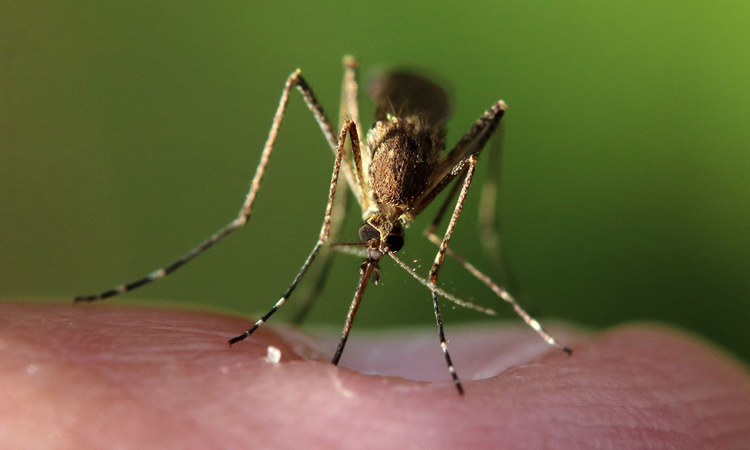Ever wonder how tiny mosquitoes make that baby buzz saw noise when they swarm around your head?
Crickets rub together parts of their wing anatomy. Grasshoppers rub their legs together to produce sound. Mosquitoes buzz with the rapid flapping of their wings – with movement of about 350 to 700 flaps per second.

Mosquitoes buzz with their wings.
Do all mosquitoes buzz?
Although only the female mosquito bites us to help further their dreadful breed, both male and female mosquitoes buzz. You probably know this typical sound is caused by the vibration of mosquito wings. But there is a distinct difference between the pitch and volume of the buzz according to mosquito gender, size and species. Buzzing also acts as a source of communication between mosquitoes.

Mosquito wings buzz.
For mosquitoes, the size of the wing depends on the size of the body, and the size of the buzz depends on the size, sex, and behavior of the mosquito. As female mosquitoes are larger than male mosquitoes, this automatically means that their wings are larger. One thing is for sure, both male and females make that whining noise.
Which types of mosquitoes buzz around Central Mass?
There are three kinds of those buzzing baddies flying about Central Massachusetts:
- Culex: Also known as the common house mosquito. There are lots of different species of Culex mosquito and you will find them anywhere in the world, except where it is permanently cold. Culex mosquitoes can measure anywhere between 0.2 and 0.4 inches in length. Hence, their buzz-o-meter, if you will.
- Aedes: This genus contains lots of exotic-disease carrying species of mosquito and has spread from tropical areas to almost everywhere on the globe thanks to us. Aedes mosquitoes measure between 0.125 and 0.3 inches from top to tail. They’re smaller but ever so much more deadly.
- Anopheles: Best known as the malaria mosquito, Anopheles is also found all over the globe. It’s this malaria parasite that has so far been eradicated here, not its method of transport. Anopheles mosquitoes are 0.15 to 0.25 inches in length.
Halt the mosquito buzzing madness with professional Boxford mosquito control.
When it comes to avoiding mosquitoes and their obnoxious buzzing and whining, there are a few things you can do. Which of these methods makes better sense for you?
- Sequester yourself indoors
- Wear noise cancelling earphones when outside
- Subscribe to professional mosquito control and do what you can to prevent them from invading your outdoor spaces
Let’s take about #3.
Professional Mosquito Control
A professionally applied mosquito control barrier treatment is the most effective way to get rid of them. Typically applied every 3 weeks, it is the surest way to help stop “the buzz” as well as the bite.
And once you understand that stagnant water outdoors is enemy number one in mosquito breeding, you can do something about it.
- Get rid of standing water in your outdoor spaces at every opportunity. Watch for standing water that may be in your child’s outdoor toys, areas underneath downspouts, plant saucers, or dog bowls – and dump it out.
- Remove excess grass, leaves, firewood, and grass-clippings from your yard as they hold the moisture that the female mosquitoes love.
- Turn over larger yard items that could hold water, like children’s portable sandboxes, plastic toys, or birdbaths.
- Tighten or remove tarps: If tarps stretched over firewood piles, boats, or sports equipment aren’t taut, they may be holding water that you should remove.
- Take care of home maintenance needs that can lead to standing water. This includes cleaning out gutters, making sure downspouts are adequately attached, keeping your grass cut low, and checking irrigation systems for leaks.
- Team Up: Despite taking all precautions in your own home, talking to neighbors is a crucial component to consistent mosquito control. Homes with little space between lots can mean that mosquitoes breed at a neighbor’s house and affect your property.
- Utilize a mosquito elimination barrier treatment around your home and yard.
Also read: Natural Mosquito Control and Mosquito Predators

Dave Macchia, Central Mass Mosquito Control Expert
